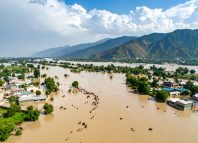Mainstreaming quality and accountability (Q&A) in Community World Service Asia
Community World Service Asia believes that the most important aspect of humanitarian and development interventions is that the assistance is truly accountable to the people it aims to support. The commitment toward accountability is demonstrated through its Accountability Framework. By mainstreaming Q&A in the organization across the board, our strategy is to ensure shifts in mindsets and practices leading to an increased capacity to self-monitor the levels of Q&A compliance. As a result, our interventions are more people centered ensuring participatory approaches, community ownership of interventions, and their inclusion in decision making processes. Individuals are treated with dignity besides providing them rights to voice their complaints.
Promoting quality and accountability across Asia
- Community World Service Asia plays a leading role in promoting and enhancing quality and accountability in Asia, through various initiatives that range from training and technical support to deploying quality and accountability teams to disaster-affected areas. Capacity building is planned for in-country or regional needs, where a joint standards approach is taken unless the training need is identified or relevant to one or several specific standards. Our trainings include orientation sessions and training of trainers (ToT) on quality and accountability, accountability framework, complaints response mechanism (CRM), Sphere and Companion Standards, Q&A self assessment audits, Q&A for project cycle management, etc. We conducted the first training in Asia that introduced more than fifteen quality and accountability standards, which resulted in the booklet, Quality and Accountability for Project Cycle Management.
- The development of resources and tools help support learning, implementation, and measurement of compliance with international quality and accountability standards. We have developed various tools, lessons learned and best practices documents, publications, and videos that build awareness. We regularly translate material to help support local organizations in adopting international standards. The Sphere Handbook and the HAP Standard are among the publications translated into Urdu, Dari, and Sindhi.
- Partnership is essential, and we work closely with the secretariats of The Sphere Project and HAP; leading trainers and facilitators from around the world; Sphere focal point organizations; and organizations which share a common interest to enhance quality and accountability of humanitarian action. We are the regional partner for The Sphere Project in fourteen countries across Asia and the lead agency for HAP in Pakistan. We regularly organize training, forums, and other platforms that encourage collaboration, learning, and advocacy for enhanced quality and accountability of humanitarian action.
Organizational development
Our training and long-term partnerships on organizational development and capacity institutionalization strengthen the capacity of individuals, civil society organizations, and other NGOs to assist and advocate for the communities with which they work. The training topics cover a wide range of needs geared to meet one of the following overarching goals: strengthened structures, enhanced effectiveness, and capacity for research and advocacy.
Quality and Accountability
We are pleased to launch “QAS in Action: A Smart Guide for Aid Actors”: This Guide aims to support a holistic and...
Humanitarian and development organisations must handle sexual exploitation, abuse, and harassment complaints professionally, but they often struggle with understanding complaint protocols and...














